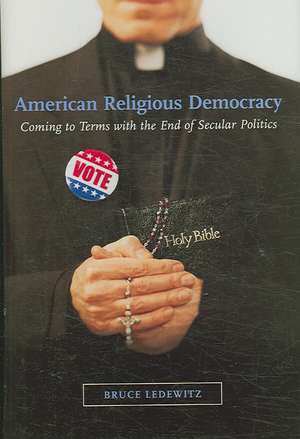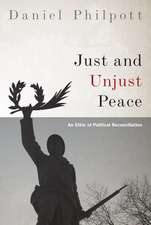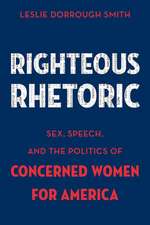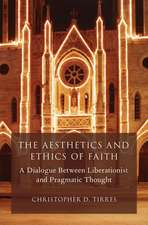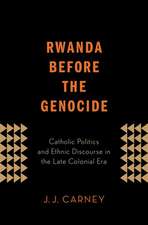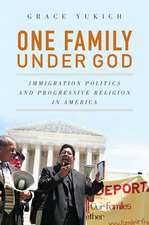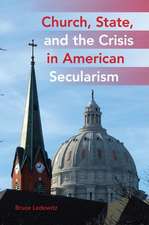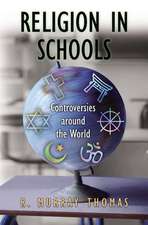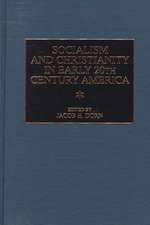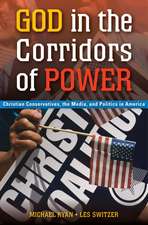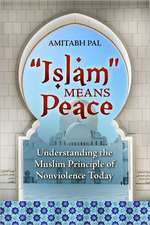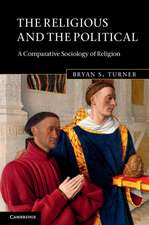American Religious Democracy: Coming to Terms with the End of Secular Politics
Autor Bruce Ledewitzen Limba Engleză Hardback – 29 mar 2007 – vârsta până la 17 ani
Preț: 438.67 lei
Preț vechi: 604.71 lei
-27% Nou
Puncte Express: 658
Preț estimativ în valută:
83.95€ • 85.97$ • 69.83£
83.95€ • 85.97$ • 69.83£
Carte tipărită la comandă
Livrare economică 19 martie-02 aprilie
Preluare comenzi: 021 569.72.76
Specificații
ISBN-13: 9780275994600
ISBN-10: 0275994600
Pagini: 264
Dimensiuni: 156 x 235 x 27 mm
Greutate: 0.57 kg
Editura: Bloomsbury Publishing
Colecția Praeger
Locul publicării:New York, United States
ISBN-10: 0275994600
Pagini: 264
Dimensiuni: 156 x 235 x 27 mm
Greutate: 0.57 kg
Editura: Bloomsbury Publishing
Colecția Praeger
Locul publicării:New York, United States
Notă biografică
Bruce Ledewitz is Professor at Duquesne University School of Law and author of several journal articles and pieces for publications such as The Wall Street Journal , Pittsburgh Post-Gazette, The Philadelphia Inquirer, The New York Times, and other news outlets.
Recenzii
[A]merican Religious Democracy is worth reading. There is increasing fermonth both in politics and in progressive religious communities about how to respond to the assertiveness and political domination of conservative evangelicals. Ledewitz has a unique view of the matter and deserves to be heard in that debate.
Ledewitz's book, which is sure to be controversial because it departs from the Supreme Court's jurisprudence as well as from the prevailing secular viewpoint in this area, is a tour de force. He writes clearly and comprehensibly, and his wide range of sources show his great erudition. They include not only relevant cases and law review articles but also Old and New Testament texts, political scientists, legal philosophers, newspaper articles, and an exhaustive list of recent books on religion in law and society.. Space here does not permit a description of how Ledewitz expands and elaborates his religious democracy thesis, applying it to current political and social issues not only in the United States but also in the world. While they are unorthodox and subversive of numerous traditional assumptions, Ledewitz's theses are cogently and articulately argued. Those who are concerned with church-state issues will certainly find much food for thought in this provocative book.
In American Religious Democracy, Ledewitz relentlessly relieves secularism's adherents of any lingering illusions about whether a momentous page has been turned in the American experiment called the United States of America..American Religious Democracy will both challenge and inform all who take the time to read it. As one who would be far more traditionally Christian in my faith affirmations than Ledewitz, I found the book enormously helpful, thought-provoking, and informative. It will be close at hand for recurrent reference by me in the coming months and years.
American Religious Democracy: Coming to Terms with the End of Secular Politics announces that the wall between church and state has crumbled--but also that a religious component of politics is good for us.
The most attractive features of this book are its honesty and its professionalism. Ledewitz hints at his opinion in many areas, but avoids an in-your-face thrusting of the left-wing agenda. He acknowledges the rights of religiously oriented voters to frame their views in faith-based terms, and doesnt use the tactics of condescension and bullying to silence them. He lays out the landscape as he sees it and suggests a new direction. For orthodox Catholics looking to understand how others view that landscape, American Religious Democracy is a good place to start.
[A]n intelligent and refreshingly balanced view of the role of religion and public life..With recent polls showing that evangelicals have been shifting to the Democrats, American Religious Democracy should be read by those of all political and religious persuasions.
In the 2004 presidential election, says Ledewitz, the American people decided that the government should endorse religion and that religion would establish a basis for American public life. He asks whether this endorsement is legitimate, if so how far it should go in what forms it should take, and how secular voters and other dissidents should come to terms with it. He hopes the losers will embrace religious democracy as an opportunity for a political and religious renewal.
Traces the decline of secularism in American political culture and argues that since the presidential election of 2004, the United States is best described as an emerging religious democracy.
Ledewitz offers readers an engaging and thought-provoking account of the strong bond between religion and politics in modern American culture.
Ledewitz's book, which is sure to be controversial because it departs from the Supreme Court's jurisprudence as well as from the prevailing secular viewpoint in this area, is a tour de force. He writes clearly and comprehensibly, and his wide range of sources show his great erudition. They include not only relevant cases and law review articles but also Old and New Testament texts, political scientists, legal philosophers, newspaper articles, and an exhaustive list of recent books on religion in law and society.. Space here does not permit a description of how Ledewitz expands and elaborates his religious democracy thesis, applying it to current political and social issues not only in the United States but also in the world. While they are unorthodox and subversive of numerous traditional assumptions, Ledewitz's theses are cogently and articulately argued. Those who are concerned with church-state issues will certainly find much food for thought in this provocative book.
In American Religious Democracy, Ledewitz relentlessly relieves secularism's adherents of any lingering illusions about whether a momentous page has been turned in the American experiment called the United States of America..American Religious Democracy will both challenge and inform all who take the time to read it. As one who would be far more traditionally Christian in my faith affirmations than Ledewitz, I found the book enormously helpful, thought-provoking, and informative. It will be close at hand for recurrent reference by me in the coming months and years.
American Religious Democracy: Coming to Terms with the End of Secular Politics announces that the wall between church and state has crumbled--but also that a religious component of politics is good for us.
The most attractive features of this book are its honesty and its professionalism. Ledewitz hints at his opinion in many areas, but avoids an in-your-face thrusting of the left-wing agenda. He acknowledges the rights of religiously oriented voters to frame their views in faith-based terms, and doesnt use the tactics of condescension and bullying to silence them. He lays out the landscape as he sees it and suggests a new direction. For orthodox Catholics looking to understand how others view that landscape, American Religious Democracy is a good place to start.
[A]n intelligent and refreshingly balanced view of the role of religion and public life..With recent polls showing that evangelicals have been shifting to the Democrats, American Religious Democracy should be read by those of all political and religious persuasions.
In the 2004 presidential election, says Ledewitz, the American people decided that the government should endorse religion and that religion would establish a basis for American public life. He asks whether this endorsement is legitimate, if so how far it should go in what forms it should take, and how secular voters and other dissidents should come to terms with it. He hopes the losers will embrace religious democracy as an opportunity for a political and religious renewal.
Traces the decline of secularism in American political culture and argues that since the presidential election of 2004, the United States is best described as an emerging religious democracy.
Ledewitz offers readers an engaging and thought-provoking account of the strong bond between religion and politics in modern American culture.
